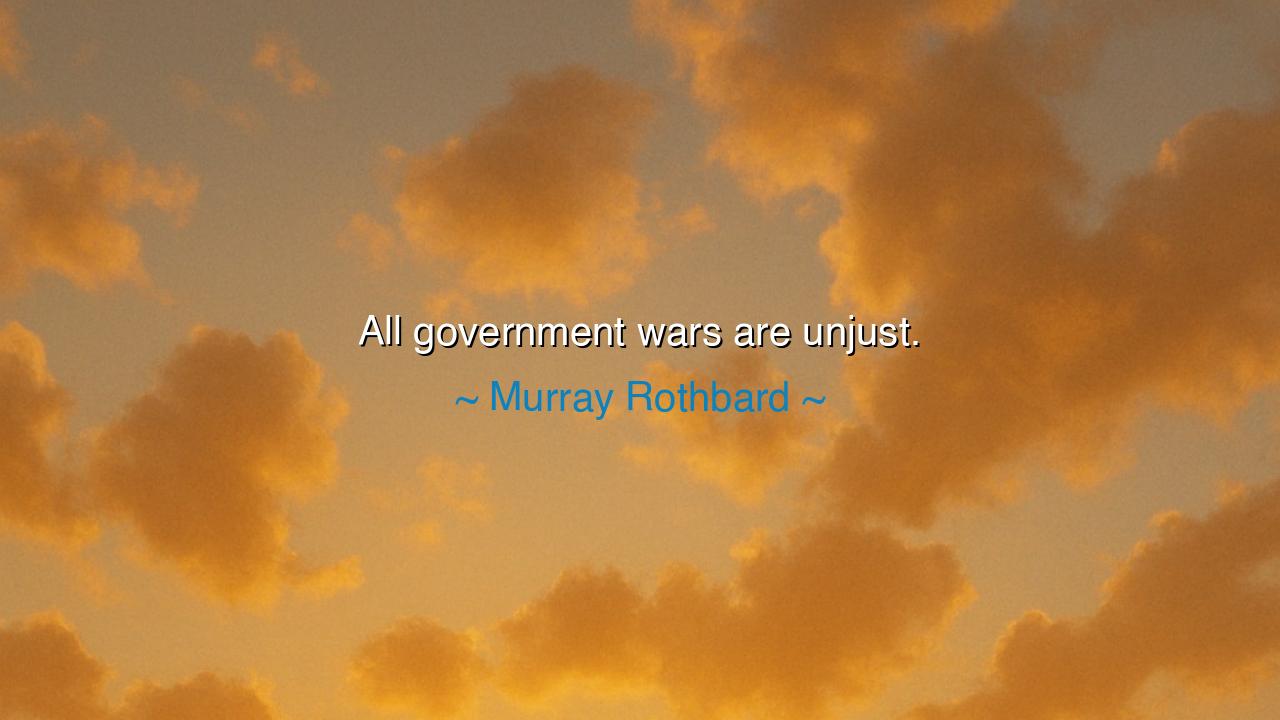
All government wars are unjust.






In an age when empires still spoke the language of conquest and nations cloaked their ambitions in the robes of righteousness, Murray Rothbard, the radical economist and philosopher of liberty, spoke a truth that thundered against the centuries: “All government wars are unjust.” His words were not the murmur of an idealist untouched by the cruelty of the world, but the cry of one who had seen through the veil of power — who understood that behind every banner of glory, behind every anthem of patriotism, there lurks the cold machinery of the state, feeding on the blood of its people.
The origin of this quote lies in Rothbard’s unyielding belief in individual freedom and his fierce distrust of all centralized power. As one of the founders of the modern libertarian movement, he argued that governments, by their very nature, exist not to protect liberty but to preserve control. When they go to war, it is never for justice or defense alone, but for expansion, pride, or profit. To Rothbard, every government war — whether draped in the rhetoric of liberation or defense — is, at its heart, a war against its own people, waged with their money, their sons, and their faith.
Throughout history, his words have been proven again and again. Consider the Vietnam War, where thousands of young Americans were sent to die in jungles half a world away, not to defend their homeland, but to sustain the illusion of political strength. The war was waged in the name of freedom, yet it devoured freedom — both abroad and at home. Innocent lives perished, the land was scorched, and truth itself was silenced beneath propaganda. What was claimed as a noble cause was, in truth, a government’s gamble with human life. The powerful planned, the press justified, and the people suffered. Rothbard saw in such conflicts not defense, but domination — not justice, but manipulation.
Even the great wars of history, often hailed as “necessary,” bear the same curse. The rulers may speak of honor, but it is the common man who pays the price. Kings once marched their armies for land and vanity, while the peasants left behind wept over the ashes of their homes. In the modern age, governments wage war with slogans of democracy and peace, yet their motives differ little from the monarchs of old. Each bomb dropped, each life taken, becomes another coin in the treasury of power. Thus, Rothbard declared, “All government wars are unjust,” because they are never fought by choice of the people, but imposed upon them by those who rule.
His vision stands in sharp contrast to the romantic myth of war. While poets once sang of heroes and glory, Rothbard stripped away the illusion and showed the tragedy beneath. He called upon men to see that the true hero is not the one who kills for the state, but the one who dares to question it. For in every age, those who challenge the march of war are branded as traitors — yet it is they who uphold the sacred law of life and liberty. To resist unjust war is not cowardice, but moral courage; to refuse blind obedience is not treason, but conscience.
There is, in Rothbard’s words, not despair, but an invitation — a call to awaken from the spell of nationalism and to reclaim the sovereignty of the individual soul. He urges humanity to see that peace cannot be built by governments, for governments profit by conflict. Peace is built by people — through trade, through friendship, through the quiet power of cooperation that crosses every border and defies every tyrant. When men choose to deal in ideas rather than destruction, commerce rather than conquest, then the dream of liberty finds its true expression.
The lesson, then, is both eternal and urgent: never surrender your moral judgment to the machinery of the state. Question every war that is called “necessary.” Demand to know not what you are told, but what is true. Remember that every bullet fired by a government was paid for by the sweat of its people and justified by the words of its deceivers. The wise must learn to see through the glitter of flags and the roar of cannons to the simple truth beneath: that freedom and war cannot coexist.
So, my children of tomorrow, hold these words as a shield against the seductions of power. When leaders call for sacrifice in the name of the nation, ask first who profits by it. When they promise peace through war, remember Rothbard’s warning: “All government wars are unjust.” For justice cannot be commanded — it must be chosen. And peace, the highest act of civilization, is not given by rulers, but kept alive by those who refuse to destroy what is sacred: the life and liberty of man.






AAdministratorAdministrator
Welcome, honored guests. Please leave a comment, we will respond soon